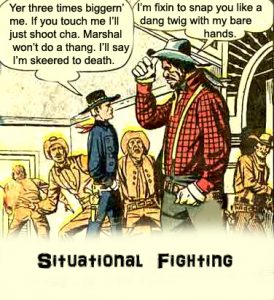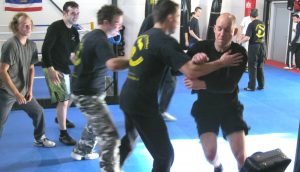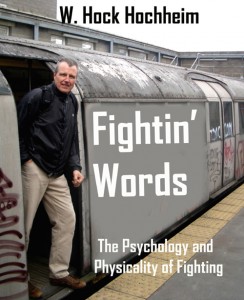
- Your “drunk uncle”
- Criminals
- Enemy soldiers
1: Who? Drunk Uncles: “Drunk uncle” is a metaphor that means all your relatives, near and dear, near and far. Kin folk or those close enough to be. It is very common in life to fight people that you do not wish to really hurt. Like your drunk buddy or uncle/relative. In police work we are also expected to fight but not really hurt people unless things get really “out-of-hand” and the situation escalates. But in person-to-person, poke your buddy’s eye out, bite off his ear, hammer-fist his throat or neck, smash his face, break bones, shatter his knee, and then see what happens to you. Usually, often, jail and lawsuits. Lots of money and problems. There is a whole lot of domestic violence out there, and violence on, and from, “who you know” is a big problem. (Remember, there are many intricacies in the complex laws of family violence, lest of all assaults and self defense.)
2: Who? Criminals: Essentially speaking, a stranger, (or for that matter even a friend, uncle or not, officially becomes a criminal when they assault you. You could just lump your uncle into this category once in a while too. But, what crime is being committed? Who, what where, when, how and why? The level of crime, the exact situation takes the exact temperature of your hot, lukewarm or cold response. Crime by the way often starts out with a trick ambush, which is a deep dive study also into the “what, where, when and “how” questions.
3: Who? Enemy soldiers: We know what those are. We usually like to kill them from as far away as possible, but often can’t do that either. Consider the military “rules of engagement.”
Civil law, criminal law and the Geneva Convention, as well as human ethics – look at fighting these three “bad guys” categories differently. Our responses and solutions confronting said “uncles, criminals and enemy soldiers” are very situational and may be:
- Surrender.
- Bargain (talk, show weapon, etc.).
- Escape (orderly retreat – you leave or he leaves).
- Hurt, on up to maim.
- Kill.
- Detain, arrest and-or take prisoner.
Of course, not necessarily in that order. All are worth exploring in training through the “who, what, where, when, how and why” questions. All have happened and will happen. I make it a point to cover all of the above in the Force Necessary courses.
Since we are Force Necessary and not Force UNnecessary, I have done sports and arts for decades. I investigate sports and arts. I only borrow and raid from sports and arts for practical applications to solve these “uncles, criminals and enemy soldier” problems. Sports and arts are great laboratories, but it takes constant vigilance to know where to draw the line between art-sports and survival.
*****
Hock’s email is HockHochheim@ForceNecessary.com
Get the book about all this and more, Fightin’ Words, click here

